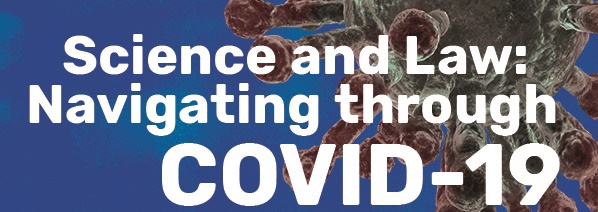
COVID-19 is a highly infectious coronavirus that jumped from an animal host to humans in late 2019 and subsequently became a pandemic. With so much information scattered over the internet, where can reliable information be found? Pitt Public Health faculty experts in the fields of biology, medicine, law, and informatics Jeremy Martinson, Wendy Braund, Elizabeth Van Nostrand, and Wilbert Van Panhuis each explores COVID-19 from their unique perspective.
Register to view webinar video
Find answers to questions like:
- How did coronaviruses make the leap from animals to humans?
- How can coronaviruses become highly infectious in humans?
- What's the current status of the outbreak and of containment measures?
- What are the impacts of pre-existing conditions, such as HIV, transplantation, and some chronic diseases on the risk of contracting COVID-19?
- How is COVID-19 transmitted? How might transmission be blocked?
- How does the clinical presentation of the COVID-19 contribute to community spread?
- What are the legal bases for policy interventions designed to 'flatten the curve'?
- How can reliable data on COVID-19—such as transcribed case information—be found and shared? Why is data integration vital to effective modeling of the outbreak?
Presenters
Jeremy Martinson, DPhil, is an assistant professor in the Department of Infectious Diseases and Microbiology at the University of Pittsburgh Graduate School of Public Health. His research focuses on the genetic interactions between infectious pathogens and the human host. He has authored and co-authored over 50 articles on the human response to infection with malaria, tuberculosis, HIV, and other viral diseases. Martinson is director of the MPH program in infectious disease pathogens and has created multiple courses in public health and pathogen biology.
Wendy E. Braund, MD, MPH, MSEd, FACPM, is a board-certified preventive medicine physician. She serves as the director of the Center for Public Health Practice, associate dean for practice, and professor of health policy and management at the University of Pittsburgh Graduate School of Public Health. Previously, while the Wyoming State Health Officer and division administrator for the Wyoming Department of Health, Braund led the state's public health emergency preparedness, response, and recovery efforts.
Elizabeth Van Nostrand, JD, is the director and principal investigator for the Mid-Atlantic Regional Public Health Training Center. She is also an associate professor in the Department of Health Policy and Management at the University of Pittsburgh Graduate School of Public Health and director of the JD and JD/MPH programs. She is the co-author of public health emergency preparedness bench books and manuals for the District of Columbia, Louisiana, and Pennsylvania. As a legal epidemiologist, Van Nostrand's current and recent research projects include using law as data for network analysis during emergency preparedness and response events, denoting legal barriers to primary care access after Super Storm Sandy, and identifying interventions used by problem-solving courts that impact morbidity and mortality for individuals with substance use disorder.
Wilbert van Panhuis, MD, MPH, is an associate professor in the Department of Epidemiology at the University of Pittsburgh Graduate School of Public Health and an associate professor in the Department of Biomedical Informatics at the University of Pittsburgh School of Medicine. His research in the fields of computational epidemiology and population health informatics aims to improve the efficient use of information for public health action. Van Panhuis uses large-scale public health data with statistical and agent-based simulation models to study the spatial spread of infectious diseases. He leads multiple large-scale global health data initiatives, including Project Tycho®, an open-access repository for global disease surveillance data, and the Models of Infectious Disease Agents Study (MIDAS) Coordination Center. His expertise in diseases concentrates on vector-borne diseases (dengue and Chikungunya) in Latin America and Southeast Asia, primarily as related to climate, and on vaccine-preventable diseases in the U.S. and EU.
Organizers and Funders
This training program for public health and clinical professionals, attorneys, researchers, students, and others interested in learning more about COVID-19 was presented by the Mid-Atlantic Regional Public Health Training Center (MAR-PHTC) in coordination with the Allegheny County Bar Association.
Funded by the Health Resources and Services Administration and based at the University of Pittsburgh's Graduate School of Public Health, the Mid-Atlantic Regional Public Health Training Center (MAR-PHTC) is a partnership among schools of public health, academic institutions, and public health agencies and organizations working to strengthen the capabilities of the public health workforce to support the delivery of high-quality public health services throughout the Mid-Atlantic region.
How to Register: Log on to marphtc.pitt.edu and sign in with your username and password. Find and select Science and Law: Navigating Through COVID-19 and click the "Enroll" button under Course Registration at the bottom of the page. After you are successfully enrolled, you will receive an email confirmation that contains important information about this course.
If you do not have an account: Visit https://lms.marphtc.pitt.edu/login/index.php to create an account. You will receive an email asking to confirm your account. Find and select Science and Law: Navigating Through COVID-19 and click the "Enroll" button under Course Registration at the bottom of the page. You will receive an email confirmation that contains important information about this course.
For more information about this course or for assistance with registration, contact marphtc@pitt.edu.
5/21/2020